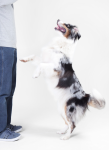Set Your Goals for Successful Dog Training Does your dog have some behaviors that you’d like to improve on? Would you like to increase your own skills as a trainer to help your dog’s long term behavior? With both New…
Blog Archives
Goals for Successful Dog Training
Tagged with: Animal training, Behavior, clicker training, Dog, dog behavior, Dog training, human dog bond, Pet Tutor, reward based training, Smart Animal Training Systems
Posted in Misc
Posted in Misc
Separation Anxiety
From Auspicious Beginnings to a Hard-won Solution – Malena DeMartini
From Auspicious Beginnings to a Hard-won Solution – Malena DeMartini My second client ever (circa 2001) was a separation anxiety case. The dog’s name was Guinness, like the beer, and his guardians had found him sickly and tattered, scavenging for…
Why getting your dog excited may affect your training session
Fear, Fireworks & Neuroplasticity: What you should never do when your dog is afraid

Modern dog training recognizes that many of our dog’s problematic behaviors are the expression of an underlying fear. When Fido is scared, he’s going to automatically flee, freeze or fight depending on whether he’s dealing with another dog, a person…
Tagged with: Animal training, Dog, dog reactivity, dogs, Fear in dogs, Jennifer Cattet, neuroplasticity, reactivity, Smart Animal Training Systems, thresholds
Posted in Dog behavior, Dog training, Dog/human relationship, Fear
Posted in Dog behavior, Dog training, Dog/human relationship, Fear
Understanding and stopping our dog from jumping on us
There are 3 Es in modern dog training: Efficacy, Efficiency and Ethics
Service dogs: The fabulous, the faulty and the fake

One in 5 people suffer from a disability according to the U.S. Census Bureau. Many can’t hear or see well enough to safely function on their own, can’t pick up an object, make a call in case of emergency, open…
Tagged with: Animal training, Dog, Dog training, Jennifer Cattet, Pet Tutor, reward based training, service dog, Smart Animal, Smart Animal Training Systems
Posted in Dog training, Dog/human relationship, Misc, service dogs
Posted in Dog training, Dog/human relationship, Misc, service dogs






